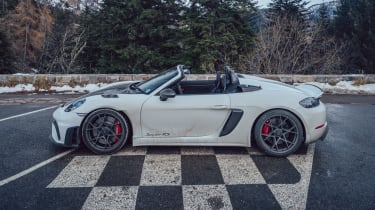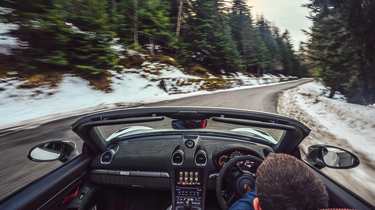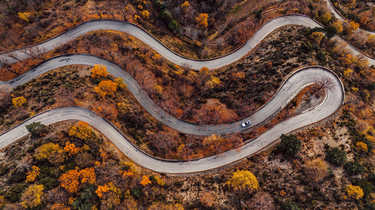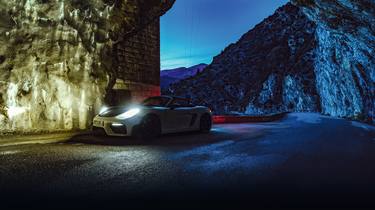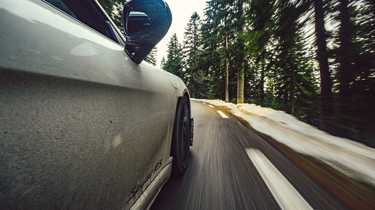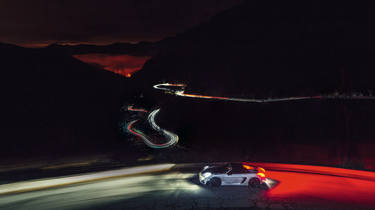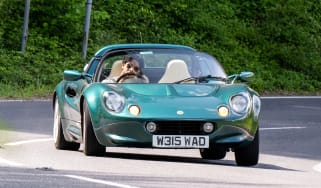Tackling the Col de Turini in the Porsche 718 Spyder RS
Some of rallying’s all-time greats have produced their most memorable drives on the epically challenging Col de Turini. We follow in their wheeltracks in one of our favourite mid-engined machines: the intoxicating Porsche 718 Spyder RS
If walls could talk, what would this particular stone wall say, I wonder. About knee-high, it’s punctuated by short gaps along its length, each exposing a cold, unyielding face at 90 degrees to the road; carnage when you drop the corner of your Impreza 555 into one on Dirt Rally 2.0, potentially career-defining if you misjudge one doing the real thing, life-threatening if you then flip over the edge.
The road I’m on is, in part, lined with them, but they’re just one hazard on this particular stretch of asphalt that has a notoriety in motorsport almost unrivalled. That’s down not only to the peculiar combination of hazards, but where it is, and what mastery of it usually leads to.
> Porsche 911 Turbo: 50 years of a supercar icon
I’m talking about the Col de Turini, historically the defining stage on the final night of the Monte Carlo Rally: a twisting, turning ascent and descent of a mountain that’s nestled close to the border with Italy, an hour and twenty minutes north of Nice. Victory here has often meant glory in one of the oldest and arguably most famous motorsport events of all.
Over the years the route has varied, but the essential elements are much the same. From the south, the D2566 runs from the village of Moulinet, situated to the north of the town of Sospel, and heads up to the col. Once there, it branches off on the M70 to Bollène-Vésubie, and the traditional stage finish. However, independently of the M70, at the summit the D2566 continues back down the mountain in a southerly direction towards the town of Lucéram, and it’s this leg, and various combinations of all three of these roads to the col, that have made up stages on the rally across the years – and indeed on national rallies, too.
The challenge is not merely the sheer technical nature of the road – more than enough in itself – or the fact that in the past it was run at midnight, but also that road conditions can vary so cruelly from top to bottom; dry tarmac one moment, damp patches the next, then maybe ice, and sometimes on the col, snow. Just how do you choose a tyre for that lot?
By the time photographer Dan Bathie and I arrive in the Spyder RS, the sun has long since set. After some hectic negotiation of repeated textbook alpine hairpins, we’re taking a breather to grab a static shot on a precipice that leans out into the valleys of les Alpes-Maritimes, the faint twinkle of the stars and the eerie silence our only companions.
Tonight it is dry and unseasonably warm, although still with a chill in the air that exposes exhalations from lungs and exhausts alike. It takes a lot to avert my gaze from the aggressive form of the RS, its musclebound presence so profound it’s easy to forget its Boxster roots, but tonight I am transfixed by the road’s surface and its environs. Just a moment ago we were living very much in the moment, the maniacal shriek of a 4-litre Porsche flat-six bouncing off grassy banks and overhanging trees and ricocheting through dank tunnels, concentration wound up to the max. Now, in the surreal quietness, I visualise the hairpin packed with raucous crowds wrapped up against the cold, waving flags and screaming at the passing rally cars – brightly coloured beasts with brakes glowing red hot and flames licking from exhausts. In my imagination I can hear the cars approaching from up the valley miles away, anti-lag set-ups like distant artillery thudding up the slopes. Legends in the making. The hairs involuntary lift on my forearms and my shoulders shudder. You can feel the history here.
Many times has the Col de Turini imposed its will on the rally. Almost too many times to mention, but two weigh on my mind right at this moment. I think of François Delecour and co-driver Anne-Chantal Pauwels in the Ford Sierra RS Cosworth 4x4 in 1991, when against the might of the Toyota and Lancia factory opposition the then 29-year-old Delecour, arguably the fieriest character ever to appear in a competition car and very much the championship new boy and underdog, blazed to the front of the field. They looked certain for a historic win, only to have something as mundane as a rear suspension rose joint fail on the col, losing them six minutes. Delecour was in tears, the fans were in tears and you could almost hear the entirety of France groaning as, virtually in sight of the finish, François and his Ford went from first to third place and victory passed to Carlos Sainz Snr in a Celica GT4.
Most of all, though, I think of Group B and the mid-1980s, with Ari Vatanen’s unforgettable victory against Audi and Lancia in his Peugeot 205 T16 on the 1985 event, and ultimately, of 1986, the final year of Group B: the year of Henri Toivonen and the Lancia Delta S4.
Just try for a moment to visualise the scale of the Monte Carlo Rally that year. It lasted for six days, consisted of 36 stages, all over the south-eastern corner of France, with 900km of special stages linked by 3000km of road miles. Crews still started from distant destinations around Europe and drove day and night to congregate (or ‘rally’) at the official start point. It makes this year’s rally look like a local club navigation event.
To tackle this intense marathon, the young Finn Toivonen had his newly minted, 500bhp, turbocharged and supercharged S4, fresh from a victorious debut on the RAC (the final round of the 1985 Championship) and commonly regarded as one of the most fearsome and tricky to drive competition cars ever conceived.
Henri could tame it though. Even when, after special stage 13, he had a sizeable road accident with an oncoming car, resulting in a pile of Lancia bits being swept to the kerb. Most assumed that was the end of his and co-drover Sergio Cresto’s rally, but the Martini Lancia team didn’t have a near-mythical status for no reason, and piece by piece, at service after service, they steadily rebuilt the S4 into a competitive machine. What they couldn’t do anything about was a bent chassis, meaning the Lancia’s wheelbase was now shorter on one side. So afflicted, the car understeered when turning one way, and oversteered when turning the other.
Toivonen kept at it though, and that night, culminating in the 22.4km Col de Turini stage in its classic Moulinet-Bollène Vésubie layout, he rocketed off into the darkness at one minute before midnight to write history…
It’s time to go. I jump into the Spyder and twist the key, the Motorsport lump catching and then idling with an intent that fizzes through the Boxster shell and leaves no room for doubt that this is a big, extraordinary engine in quite a small car. That’s so often been the stuff of dreams, and it certainly doesn’t disappoint here. I already know that I love the Spyder RS. No, scratch that, I adore it. I like its twin, the GT4 RS, too, but somehow the Spyder RS has already exceeded it in my affections. No, it isn’t as stiff, both in terms of structure and suspension, but the former really isn’t noticeable (on the road, at least), and the latter is, I am convinced, a very good thing for road driving.
That 493bhp, 332lb ft flat-six has 1410kg to push, making the RS one of the lightest of the modern-era Porsches, and it kicks on with a feral response, the blade-like snap of the throttle opening signalling the sharpest and most direct connection between ankle movement and forward motion. All the things we take for granted with Porsches like this are delightfully present: the seats are terrific, the driving position without fault, the lovely consistency of the steering so reassuring and inclusive, dissolving almost instantly any residue of intimidation you might have felt piloting such a potent car. In essence, the RS goes exactly where you point it, the sense of balance from axles front and rear assuring you that it won’t be doing anything untoward.
The simpler, manual roof of the RS doesn’t even try to offer the snug environment of the regular Boxster’s item. The engineer who developed it is here on this trip; there was a certain corporate nervousness that such a canvas offering wouldn’t meet the Germanic engineering standards so carefully upheld by the company, but the reality is fine. Yes, there’s more background noise, as if the window hasn’t quite sealed properly on the standard roof, and if I’d had to drive the RS down here from the UK there would have been times when I would have turned the music up to try and drown it out, but it’s really not bad at all and worth it for the RS’s 25kg weight saving compared with a Boxster GTS 4.0 PDK.
From the gently weaving sections in the valleys below, we begin to climb, leaving behind hamlets crowded around the road and the vertical rock faces, before emerging at higher altitude with big drops on the outside and rocky, grassy slopes adorned with clusters of small trees gamely hanging on by their roots. The road is more open for a while, with classic uphill hairpins to negotiate, before everything closes in again and the straight sections get shorter. Now the hairpins are more densely wooded, and as I tip the RS into another sequence of curves we enter a tunnel that runs along the mountain’s edge. On and on we climb until we emerge, almost without warning, onto the col itself.
Given the reputation of the road, the summit is underwhelming to say the least. There are a couple of hotels (one filled with memorabilia, from memory, but it’s closed today), a few houses… and that’s about it. It’s not easy to relate this deserted settlement to those scenes from 1986, where the cars popped into view sideways on the snow, to be greeted by a sea of humanity, fireworks, flashbulbs and snowballs, French fans on one side of the road, Italians on the other. And that’s the final piece of the puzzle as to what makes this road great: given its geography, it’s always been a place where a Franco-Italian crowd can have a good old party. To see it so deserted is perhaps peculiarly French: like Reims and Rouen, motorsport history is easily downplayed, if not swept aside, in this country.
There’s a flight with my name on it and it’s leaving from Nice airport very soon. Having driven up effectively the ‘wrong’ way on the M70, I’m forced – despite Dan and I being so very tempted – to go straight down on the westerly section of the D2566. It’s not the moment to spare the horses, but I just don’t dare push too hard – although the temperatures are hovering around zero, at higher altitude there are definite frost patches on the road, particularly now we’re in heavily wooded areas. The RS’s headlamps shoot their brilliantly sharp light through the trees, creating what fans once called ‘the long knives’, and at times we break through the trees and into a downhill ninety left that appears to be suspended virtually in mid-air. Beyond, all I can see is the flickering lights of Monte Carlo miles in the distance.
Just how did Toivonen push at this very moment? The idea of braking for one of these Armco-lined corners on mixed ice/tarmac turns my stomach to jelly, but in a seething, sneezing Delta S4? Right in that moment my appreciation for his and others’ achievements up here goes a notch higher still. It is beyond my comprehension, frankly, and I just try to set a decent pace that won’t see a crumpled RS against a rock face.
Eventually the road dries with falling altitude and the corners begin to become tamer. We hit the first traffic of the entire evening, and soon there are headlights behind. In an ageing Clio, two lads are stuck limpet-like to our rear bumper, their faces lit by the high-intensity brake lights of the RS like scouts around a campfire, their souls in raptures at the shrieks, pops and bangs from its exhaust.
This year the Monte Carlo Rally had around a third of the total stage and road mileage of 1986 and lasted half the time. Bollène-Vésubie to the col was the 17th and last stage of the rally, the Power Stage. And so the Col de Turini endures, even though it isn’t quite what it was.
Will we say the same about the Boxster, given the Spyder RS is the final hurrah for this perennial sports car in internal combustion form? For so long it has been the essential everyday sports car, virtually without peer. Tomorrow, will anyone care about a Boxster EV? Time will tell about that, but in the meantime I can’t think of a more electrifying combination of car and road than the Spyder RS on the Col de Turini.
This story was first featured in evo issue 320.

